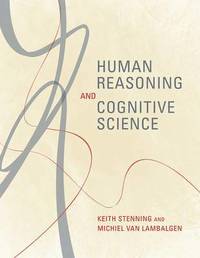
- Format
- Häftad (Paperback / softback)
- Språk
- Engelska
- Antal sidor
- 424
- Utgivningsdatum
- 2012-01-20
- Förlag
- Bradford Books
- Illustrationer
- 38 figures, 12 tables
- Dimensioner
- 215 x 165 x 19 mm
- Vikt
- Antal komponenter
- 1
- ISBN
- 9780262517591
- 644 g
Human Reasoning and Cognitive Science
Kundrecensioner
Fler böcker av författarna
-
Seeing Reason
Keith Stenning
-
The Complex Mind
David McFarland, Keith Stenning, Maggie McGonigle
-
Complex Mind
David McFarland, Keith Stenning, Maggie McGonigle
-
The Role of Communication in Learning To Model
Paul Brna, Michael Baker, Keith Stenning, Andree Tiberghien
Recensioner i media
"Once in a while there is a body of work that reconceptualizes a topic of research. This book reports and reviews such a body of work. The result is a framing and hypotheses about reasoning that, in my judgment, fundamentally reconstructs the psychology of inferential reasoning... This book will be regarded as the major turning point in the field's development."--James Greeno, Learning Research, and Development Center, University of Pittsburgh -- James Greeno, Learning Research, and Development Center "This deep and stimulating book, by a leading psychologist and a leading logician, is about the choice of logical formalisms for representing actual reasoning. There are two interlocking questions: what are the right formalisms to represent how people reason, and what forms do the reasoners themselves bring to the world in order to reason about it? The authors'answer to the first question, using closed-world reasoning, allows them to analyse the wide range of strategies that people use for shaping their thinking. For example the book uncovers important links between autism and nonmonotonic reasoning. This may be the first book in cognitive science that logicians can learn some new logic from."--Wilfrid Hodges, Queen Mary, University of London -- Wilfrid Hodges, Herons Brook "Once in a while there is a body of work that reconceptualizes a topic of research. This book reports and reviews such a body of work. The result is a framing and hypotheses about reasoning that, in my judgment, fundamentally reconstructs the psychology of inferential reasoning... This book will be regarded as the major turning point in the field's development." James Greeno , Learning Research, and Development Center, University of Pittsburgh "This deep and stimulating book, by a leading psychologist and a leading logician, is about the choice of logical formalisms for representing actual reasoning. There are two interlocking questions: what are the right formalisms to represent how people reason, and what forms do the reasoners themselves bring to the world in order to reason about it? The authors' answer to the first question, using closed-world reasoning, allows them to analyse the wide range of strategies that people use for shaping their thinking. For example, the book uncovers important links between autism and nonmonotonic reasoning. This may be the first book in cognitive science that logicians can learn some new logic from." Wilfrid Hodges , Queen Mary, University of London
Övrig information
Keith Stenning is Professor of Human Communication in the School of Informatics at the University of Edinburgh. He is author of Seeing Reason and coauthor of Introduction to Cognition and Communication (MIT Press, 2006).
Du kanske gillar
-
Atomic Habits
James Clear
Häftad
